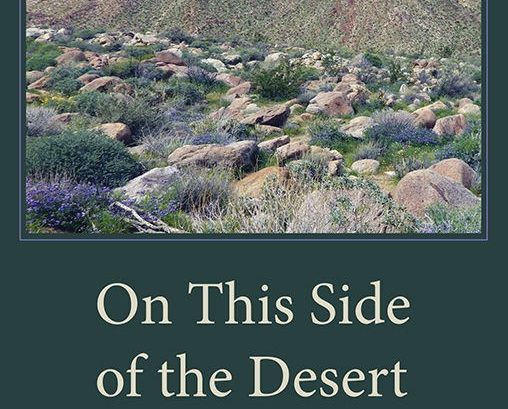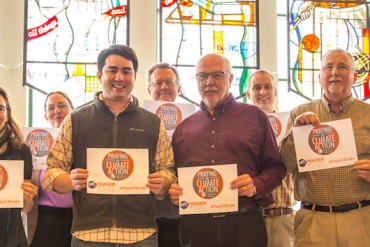For anyone who grew up along the U.S.-Mexican border, life was no doubt unique. The border from California to Texas is by no means a monolith, and there is as much cultural, social, and economic diversity along the region as there is throughout the rest of the country. But the manner in which Alfredo Aguilar’s On This Side of the Desert faithfully captures the memory of living there while illuminating the social and political aspects of the land invites us all to share this unforgettable experience, regardless of where they’ve from.
Winner of the 2019 Stan and Tom Wick Poetry Prize, selected by Natalie Díaz, Aguilar’s debut is a conversation with the complexity of familial relationships, with a land that is as cruel as it is beautiful, and with the ways one must navigate the cultural terrain of the United States and Mexico. One the most important poems that begins the collection is “My Mother Drove Us Into Tijuana For Dentistry,” detailing the speaker’s mother’s return to Mexico:
because we didn’t have
american health insurance.
past otay mesa checkpoint
were billboards in spanish
& narrow rattled streets.
on our left were rows of cars
waiting to enter the u.s.—
our dentist, ignacio, was a friend
from my mother’s childhood & often
they’d reminisce about their small town.
folks they knew, folks that had passed—
how the town looked so different now—
how their lives led them here,
with my mother leaving the country.
The irony here is quite striking. The only way that the mother can get her teeth worked on is by returning to her home country (a practice that is used frequently by those who live along the border, since medical services, medications, and dentistry are objectively much cheaper in Mexico). We live in the richest country that has ever existed in world history and yet the access to even the most basic of dentalcare and healthcare is not available to many. The speaker gets an impression for retainers, and although the experience is mundane and innocent enough, he is left realizing that his mother left her country to be able to do exactly this. While there is indeed a recognition of the shortcomings of a government that does little to provide for immigrants, there is also an acknowledgment of the privilege this scene entails, of the fact that his mother can go to Mexico and when her dental work is done, return to her adopted country with relative ease.
The journey to the United States that the speaker’s parents endured was anything but easy, especially for the father, which the speaker details in “When La Migra Caught My Father”:
the first time, he was young—still without
a family of his own. the white border patrol agent
clad in green drove my father back
to the border & knowing he would try again,
the way everyone does, told him it’s your job
to try to get in & it’s our job to try & keep you out.
The border patrol agent treats catching the speaker’s father, as well as others that cross the border, as if it were a game of cat and mouse, and he understand that this, regardless of morals or injustices, is just the way that things are done. This obviously occurred in a much “simpler” time period, one where the act of crossing wasn’t seen by those on the right in this country as an existential threat to their livelihood and that didn’t result in such blatant xenophobic rhetoric that we see in today’s political and daily discourse. At the end of the poem, the speaker also recognizes that even the neighborhoods on this side, with their “immaculate yards, roads & cars / make poor strangers unwelcome,” and the purpose of the suburbs has always been to separate one class from the other.
Apart from the social implications that Aguilar explains, he also examines cultural and familial interactions and how they influence the idea of masculinity. “My Father Makes Me Hold A Hen” looks at the rather violent means of killing a hen (which we can assume is being done to eat):
against the dirt. i feel its plumage,
panic as it struggles to get out
of my grip. he yells at me
con ganas! come si tienes huevos!
& lightning flashes
through me. i want to shove him,
but i do nothing, say nothing—
just clench the bird’s wings tighter
as he brings the knife down on its neck.
once my father looked at me
& said i don’t know what’s to become
of you & i think he meant
i was never who he expected—
The father believes that his son is not “man enough,” and when he once sees his son’s “tight-fitting jeans” hanging on the clothesline, he hides them, fearing that the speaker will in some way become feminized in a way he is not comfortable with. This machismo, unfortunately, is still common, but the father making the speaker kill a hen, as though violence is the best means by which to toughen someone up, is his last-ditch effort to remain in control, or to at least believe that the world is meant to be a certain way, however close-minded that way might be. The son never reveals what his sexual preferences are, and he doesn’t have to. What matters is that there is space for reflection, and Aguilar, with such a keen understanding of the nuances of not only his culture, but the world at large, spares no page ensuring that he has the room to do exactly that.
I remember first reading Tomás Rivera’s …no se lo tragó la tierra (…And the Earth Did Not Devour Him) in high school and feeling validated, like so many of my classmates, that a book could capture my experience of living along the Texas-Mexican border. In the same vein as Rivera, Aguilar’s On This Side of the Desert seeks to not only capture the most important parts of his childhood, but to bring to the forefront the nuances and complexities of his culture, identity, and the politics of border life that is true to so many. Because of Aguilar’s narrative-driven voice and his gift to bring lyricism to every scene, honesty blooms on every page, which is what great poetry always seeks to do.





